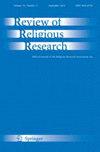宗教信仰是否能缓冲工作-家庭压力对心理健康的负面影响?检查被忽视的资源的作用
IF 1.7
1区 哲学
0 RELIGION
引用次数: 0
摘要
北美员工在管理工作和家庭生活方面面临着重大挑战。根据Hobfoll 2001年的资源守恒(COR)理论,工作家庭学者认为,一些资源可以有效地缓冲工作家庭界面中的冲突。我们分析了加拿大全国工人样本(N = 3431)的数据,以评估宗教/灵性的两个组成部分-宗教出席和神圣控制-如何缓冲工作与家庭冲突(WFC)和家庭与工作冲突(FWC)的心理健康影响。结果表明,工作与家庭的冲突和家庭与工作的冲突都与较高水平的心理困扰有关。我们的研究结果进一步表明,宗教出席可以缓冲WFC和FWC对心理困扰的有害影响,而神性控制只能缓冲FWC的影响。这些模式似乎没有因性别而异。鉴于北美地区工作与家庭之间的紧张关系日益加剧,我们的研究结果呼吁拓宽有关工作与家庭关系的文献,考虑到被忽视的宗教和灵性的作用。本文章由计算机程序翻译,如有差异,请以英文原文为准。
Does Religiosity Buffer the Adverse Mental Health Effects of Work-Family Strain? Examining the Role of an Overlooked Resource
North American employees face substantial challenges in managing their work and family lives. Drawing from Hobfoll’s 2001 conservation of resources (COR) theory, work-family scholars have argued that some resources can be effective in buffering conflict in the work-family interface. We analyze data from a national sample of Canadian workers (N = 3,431) to assess how two components of religion/spirituality—religious attendance and divine control—buffer the mental health effects of work-to-family conflict (WFC) and family-to-work conflict (FWC). Results suggest that both work-to-family conflict and family-to-work conflict were associated with higher levels of psychological distress. Our results further reveal that religious attendance buffered the pernicious effects of both WFC and FWC for psychological distress, while divine control only buffered the effects of FWC. These patterns did not appear to differ by gender. Given increasing rates of work-family strain in the North American context, out findings call for a broadening of the literature on the work-family interface, one that takes into consideration the overlooked role of religion and spirituality.
求助全文
通过发布文献求助,成功后即可免费获取论文全文。
去求助
来源期刊

Review of Religious Research
Multiple-
CiteScore
2.50
自引率
20.00%
发文量
31
期刊介绍:
The Review of Religious Research (RRR) publishes empirical social science research on religion, primarily in sociology and social psychology and related fields of psychology, and scholarly literature reviews of research in these fields. RRR provides a forum for research across multiple disciplines and approaches, including research on the following topical areas: Clergy; Church programs; Comparative analyses of religious denominations and institutions; Denominational and congregational growth, decline, and vitality; Denominational and congregational conflict, competition, and cooperation; Ethnicity/race and religion; Generational and personal religious change; New religious movements; Personal spiritual and religious beliefs and practices; Religion and attitudes; Religion and family; Religion and gender, Religion and social behavior; Religion and well-being; and Research methodology. Among the characteristics that distinguish RRR from other academic journals on the study of religion are its applied focus and the opportunities it offers for academics and denomination-based researchers to share their findings with each other. RRR aims to facilitate the sharing and comparing of applied studies between denominational and academic researchers. RRR is the official quarterly journal of the Religious Research Association, Inc. RRR regularly publishes Original Articles, Research Notes, Review Articles, Applied Research Abstracts, and Book Reviews, and occasionally publishes articles on the Context of Religious Research. Applied Research Abstracts: This type of publication (previously called Denominational Research Reports) consists of a 350-550 word summary (without any references) of an applied research study in the form of a structured abstract, with the following section headings: Background, Purpose, Methods, Results, and Conclusions and Implications, followed by 3-4 keywords. The author may included a footnote that states: (a) whether a complete report exists and how it can be obtained; (b) whether the raw data are available in electronic form and how they can be obtained if the authors wish to make them available to other researchers; and (c) whether the authors would like to collaborate with other researchers to further analyze the data and write a full report for possible journal publication as a peer-reviewed manuscript. Such abstracts should be submitted to the journal editor for consideration for publication. Book Reviews: Unsolicited book reviews are not accepted for publication in RRR. If you would like to review a book for the journal, contact the Book Review Editor, David Eagle, Ph.D. – david.eagle@duke.edu Context of Religious Research: This journal heading covers items about awards and announcements, memoriams, and articles about the research process (e.g., articles on research methods and statistics, and profiles of denominational research organizations), as well as invited addresses to the Religious Research Association. Unsolicited articles should be submitted to the journal editor for consideration for publication. Original Articles: These are scholarly and methodologically sophisticated research studies: see Information for Authors on this website and the Submission Guidelines on the Springer RRR website for details (https://www.springer.com/13644) Reseach Notes: These are scholarly and methodologically sophisticated research studies: see Information for Authors on this website and the Submission Guidelines on the Springer RRR website for details (https://www.springer.com/13644) Review Articles: Authors should send an email to the journal’s editor describing the nature and scope of a proposed literature review to see if it is suitable for publication in RRR. See Information for Authors on this website and the Submission Guidelines on the Springer RRR website for details (https://www.springer.com/13644) The journal’s editor is Kevin J. Flannelly, Ph.D. – kjflannelly@gmail.com
 求助内容:
求助内容: 应助结果提醒方式:
应助结果提醒方式:


